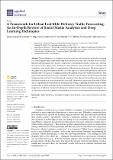A Framework for Urban Last-Mile Delivery Traffic Forecasting: An In-Depth Review of Social Media Analytics and Deep Learning Techniques
Author(s)
Laynes-Fiascunari, Valeria; Gutierrez-Franco, Edgar; Rabelo, Luis; Sarmiento, Alfonso T.; Lee, Gene
Downloadapplsci-13-05888-v2.pdf (3.918Mb)
Publisher with Creative Commons License
Publisher with Creative Commons License
Creative Commons Attribution
Terms of use
Metadata
Show full item recordAbstract
The proliferation of e-commerce in recent years has been driven in part by the increasing ease of making purchases online and having them delivered directly to the consumer. However, these last-mile delivery logistics have become complex due to external factors (traffic, weather, etc.) affecting the delivery routes’ optimization. Intelligent Transportation Systems (ITS) also have a challenge that contributes to the need of delivery companies for traffic sensors in urban areas. The main purpose of this paper is to propose a framework that closes the gap on accurate traffic prediction tailored for last-mile delivery logistics, leveraging social media analysis along with traditional methods. This work can be divided into two stages: (1) traffic prediction, which utilizes advanced deep learning techniques such as Graph Convolutional and Long-Short Term Memory Neural Networks, as well as data from sources such as social media check-ins and Collaborative Innovation Networks (COINs); and (2) experimentation in both short- and long-term settings, examining the interactions of traffic, social media, weather, and other factors within the model. The proposed framework allows for the integration of additional analytical techniques to further enhance vehicle routing, including the use of simulation tools such as agent-based simulation, discrete-event simulation, and system dynamics.
Date issued
2023-05-10Department
Massachusetts Institute of Technology. Center for Transportation & LogisticsPublisher
Multidisciplinary Digital Publishing Institute
Citation
Applied Sciences 13 (10): 5888 (2023)
Version: Final published version